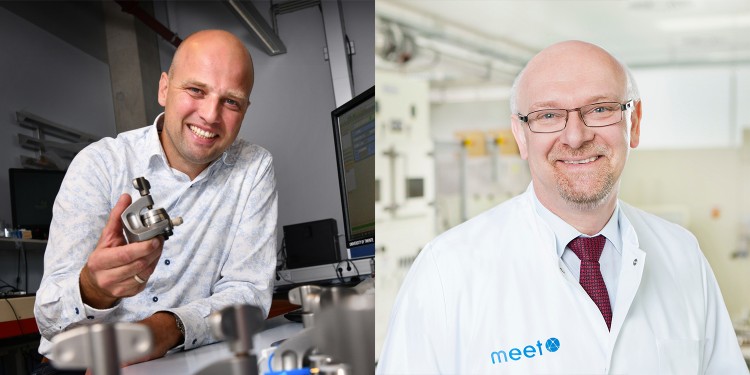
"Battery research does not stop at national borders"
The Universities of Twente (UT) and Münster have maintained a close partnership for many years. One focus that the two partners now want to deepen is battery research. On the occasion of the signing of the partnership deed between the cities of Münster and Enschede, the two university leaderships and scientists met to discuss the content-related orientation of battery research. In an interview with Kathrin Kottke, Prof. Martin Winter from MEET Battery Research Center at the University of Münster and Prof. Mark Huijben from the "Twente Centre for Advanced Battery Technology" at UT talked about their cooperation and common goals.
You have already been working together in the field of battery research for several years, how do the two Universities complement each other?
Winter: Together, our two teams cover the entire value cycle of battery cells and systems: from the development of new or improved materials to battery cell designs and manufacturing to the recycling of energy storage devices. At MEET, we pursue holistic, systemic research for the development of electrochemical energy storage devices and converters up to the cell level. This process also encompasses the multiple aspects of application, including economic viability, environmental impact and societal impact.
Huijben: Our focus is on the development of advanced materials and chemical processes for 'next generation' batteries. Through the Faculty of Engineering and the Fraunhofer Project Center, we have a strong focus on advanced manufacturing at the University of Twente. Both MEET and the Fraunhofer Project Center are partners in the new Research Fab Battery Cells of Fraunhofer Society. We complement each other perfectly.
How does the cooperation work at a distance?
Winter: Both in Münster and in Twente we put a lot of emphasis on interdisciplinary cooperation. That is a prerequisite for joint success. In Münster, the large network of around 300 battery researchers on site is formative. In addition to MEET, this includes the Helmholtz Institute Münster, a branch of Forschungszentrum Jülich, the Department of Chemistry and Pharmacy at the University of Münster - one of the largest of its kind in Germany – and the Research Fab Battery Cells of Fraunhofer.
Huijben: Currently, for example, we are working together on the creation and investigation of advanced coatings to improve the stability of anodes in batteries. To this end, we have specifically designed materials for this project that have been exchanged materials between the two laboratories and conducted comprehensive analysis experiments. Recently, we also started a new research project on solid-state electrolytes. Here we are investigating the electrochemical performance of highly ordered thin-film model systems. We hope this will provide fundamental insights into the necessary action items to overcome the bottlenecks in realising practical solid-state battery devices. This joint effort is unique and only possible through the combination of solid state electrolyte expertise at Münster University and atomically controlled thin film synthesis at UT.
What projects have you done together?
Huijben: After numerous scientific exchanges on research and mutual invited presentations, a joint collaboration grant from Münster and Twente Universities on the research topic 'Nanostructured interfaces for next-generation batteries' be considered as the real start of collaboration in 2018. It is based on the strengths of MEET in battery technology and the MESA+ institute at the University Twente in nanotechnology. This results in unique research opportunities, this is crucial for future breakthroughs in the realisation of enhanced energy storage.
Winter: In addition, with the project 'BatteryNL – Next Generation Batteries based on Understanding Materials Interfaces', coordinated by TU Delft, there is a multi-year project in which both MEET and UT are involved.
The researchers thus maintain a close exchange – but do students also benefit from the cooperation?
Huijben: Students can take courses on battery technology in exchange programmes at both universities. At both locations, we offer a wide range of courses directly related to battery technology, such as materials science and engineering, chemistry, nanotechnology and advanced manufacturing. After their Master's or PhD degree at the partner institute, graduates can continue working at the other institute. For example, a former PhD student from my research group continued his academic career in Prof. Wolfgang Zeier's research group at Münster University.
Winter: We generally integrate students into our project and research work through research internships, Bachelor's and Master's theses or doctoral theses. They work with renowned experts and young researchers on current topics in battery research. I look forward to welcoming students from the University of Twente to our laboratories in the future, or enabling students from Münster to spend time in the Netherlands.
What is planned for the future?
Huijben: We are currently in the process of setting up a long-term, cross-national battery research programme between Münster and Twente. This bilateral collaboration will require start-up funding, which is different from the usual national funding opportunities in Germany and the Netherlands or the large research consortia in Europe.
Winter: The need for battery research does not stop at national borders. We are separated by barely 70 kilometres, which is a strategic advantage for our cooperation. For example, we are currently developing a tandem programme for students and researchers. Together, we want to contribute to the transnational qualification of battery specialists and support local and regional energy and climate plans. For regional and supra-regional industry and science and for international players, we want to be attractive contacts for German-Dutch battery research.
